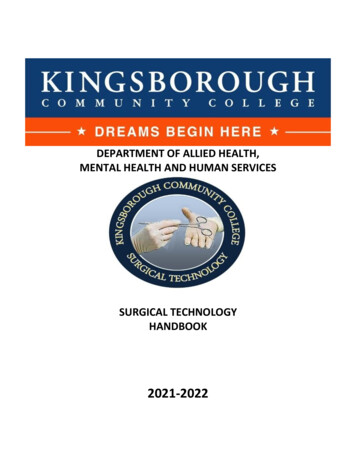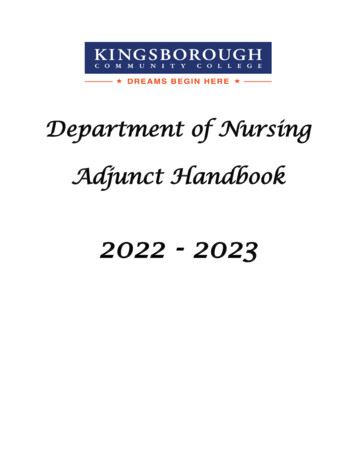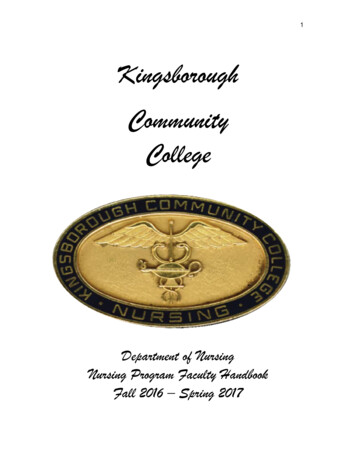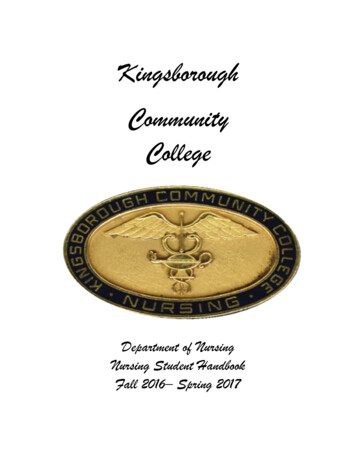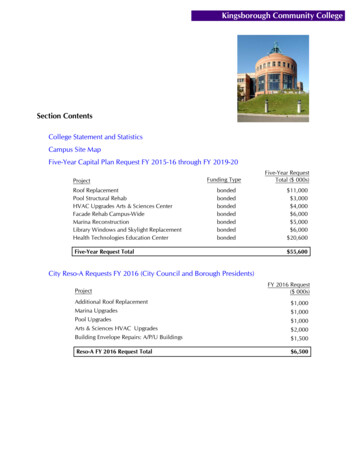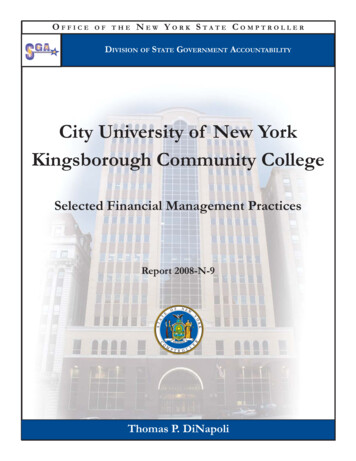
Transcription
Nursing 2000 – Nursing the Emotionally Ill, page 1 of 32Kingsborough Community CollegeThe City University of New YorkDepartment of NursingNursing 2000 – Nursing the Emotionally IllCourse Syllabus: Fall 2020HybridProfessor Erin Murphy Smith RN, MSDeputy Chair,Associate ProfessorCourse CoordinatorProfessor Catherine Wilson Mooney RN,MSProfessor Diane McDevitt RN, MS,ACNS-BC, ANPAssociate ProfessorAssistant ProfessorCredit – Hours: 4 credits, 14 hours. One-half semester (6 weeks)Prerequi- NUR 2100,sitesPre-req- PSY 3200uisite orCo-requisiteRecommended:SOC 3100; ENG 2400Contact InformationErin Murphy Smith Erin.Smith@kbcc.cuny.eduM 407 718 368-5486Office Hours Mondays 9:15-10:15 AM, 4:00-5:00 PMTuesdays 10:15-11:15 AM, 1:30-2:30 PMDiane McDevitt Diane.mcdevitt@kbcc.cuny.eduM 409 718 368- 5839Office Hours on Mondays 9:15-10:15 AM, 4:00-5:00 PMThursdays 3:00PM-4:00 PMCatherine Wilson Mooney Catherine.Mooney@kbcc.cuny.eduM 437 718 368-5409Office Hours Mondays 8:00-9:00 AMThursdays 8:00-9:00 AM, 3:00-4:00 PM08/11/20 (08/06/2014, 8/5/2015, 02/05/16,1/26/18, 8/13/18,8/1/19,2/14,2020,4/2020
Nursing 2000 – Nursing the Emotionally Ill, page 2 of 32Course DescriptionThis course focuses on Nursing care of emotionally ill patients who are experiencing difficultymeeting psychosocial needs. It also focuses on how emotional illness affects the needs of the individual and family in their efforts to adapt to stressors. The physiological and psychologicalneeds of the patient are addressed through Quality and Safety for Nurses (QSEN) Initiative incorporating the concepts of patient-centered care, teamwork and collaboration, evidence-basedpractice, safety, quality improvement and informatics, the nursing process, and the Categories ofClient Needs. Students are also introduced to the principles of management of patient groups.Class work for a typical week consists of five (5) hours of classroom instruction, two (2) hourweekly college laboratory/simulation, and eight (8) hours of health agency experiences. It is essential for students to engage in additional practice for further development of skills. Provisionsare available for additional time in the college laboratory for practice.This course is listed as a hybrid course. Due to the Covid-19 Pandemic the course will be conducted online (synchronously and asynchronously). That is, the lecture, lab, and clinical component will be synchronous via Zoom.In general, Clinicals will take place virtually. However, on days yet to be determined duringMini1, when clinical will take place on campus in the lab so students may practice skills. Moreinformation regarding these practice sessions will be provided at our first meeting on September14, 2020.All students should ensure they have access to their cuny.edu email, their library account,CUNYfirst, Office365, CUNY Virtual Desktop, CUNY Dropbox. For assistance, contact the student Helpdesk at L-106 or email at :helpdesk@students.kbcc.cuny.edu or phone 718-368-6679.Class work for a typical week consists of five (5) hours classroom instruction, one (1) hourweekly college laboratory, and eight (8) hours of clinical experience including VSims experiences. It is essential for students to engage in additional practice for further development ofskills. Provisions are available for additional time in the virtual laboratory for practice.STUDENT LEARNING OUTCOMES (SLOs)Upon completion of Nursing 2000, using the Nursing Process in a variety of health care settingsto a diverse population of mental health patients, the student will:Course SLOs1. Structure safe, compassionate, nursing care to patients within the continuum of care inmental health services.2. Prioritize patient-centered nursing interventions for patients with mental health problemsand disorders.3. Deliver nursing care supported by principles of evidence-based practice.08/11/20 (08/06/2014, 8/5/2015, 02/05/16,1/26/18, 8/13/18,8/1/19,2/14,2020,4/2020
Nursing 2000 – Nursing the Emotionally Ill, page 3 of 324. Apply critical thinking and clinical reasoning strategies when providing care in mentalhealth nursing.5. Implement principles of teamwork and collaboration when working with members of theinterdisciplinary mental health team.6. Analyze pertinent leadership/management methods when providing care.7. Demonstrate accurate quality documentation while using the principles of information services and systems when providing care.8. Practice professional nursing within an ethical and legal framework to protect the rights ofmental health patients.ASSESSMENT MEASURES for COURSE SLOsStudents will perform satisfactorily in the classroom, laboratory/simulation and clinical settingas evidenced by achieving 75% or greater on written exams, completion/submission of variouscourse specific written assignments, and demonstration of satisfactory performance on coursespecific clinical competency and evaluation tools.ASSESSMENT TECHNOLOGY INSTITUTE (ATI) TESTINGKingsborough’s Nursing Department uses ATI Nursing Education tutorials, testing and remediation each semester. Active participation in ATI assignments and testing is a requirement of thiscourse and will account for 2% of the course grade. Notice will be given on updates of ATIproctored exam.ATTENDANCEComplete participation in class is possible only when students are able to focus attention on theclass; therefore, entering class after it has begun is disrespectful to Faculty and classmates. Talking out of turn or exhibiting other disruptive behaviors is not tolerated and students will be askedto leave the classroom or lab.All cell phones, smart devices or other multimedia devices that generate sound must be muted orturned off during lectures, labs and clinicals. Students must exit the virtual classroom to make orreceive calls.A student is deemed excessively absent in any course when he or she has been absent 15% of thenumber of contact hours a class meets during a semester. When a student is excessively absent, agrade of “WU” will be assigned as described in the college catalogue. Attendance at pre- andpost-conference for laboratory experience is required. Absence from either pre- or post-conference constitutes an absence for the day’s experience.STUDENTS WITH DISABILITIES08/11/20 (08/06/2014, 8/5/2015, 02/05/16,1/26/18, 8/13/18,8/1/19,2/14,2020,4/2020
Nursing 2000 – Nursing the Emotionally Ill, page 4 of 32Access-Ability Services (AAS) serves as a liaison and resource to the KCC community regarding disability issues, promotes equal access to all KCC programs and activities, and makes everyreasonable effort to provide appropriate accommodations and assistance to students with disabilities. Your instructor will make the accommodations you need once you provide documentationfrom the Access-Ability office (D-205). Please contact AAS for assistance.EXAM POLICYPursuant to accreditation requirements, the nursing program requires the mandatory use of remote proctoring tools for exams for all students in all nursing courses, regardless of whether a course is given inperson or remotely. All course exams are administered electronically via Blackboard. Students will bemonitored during the exam therefore it is imperative that the student use a computer with audio and videocapabilities. Further, for all exams, students must have access to adequate Wi-Fi and be in an environment that is free from distractions and personal items. Students are referred to the attached CUNY Policyon Academic Integrity, which will be strictly enforced throughout the exam. If students have any questionsor concerns during the exam, they may raise them with the instructor only through Zoom chat.EVALUATIONGrades will be calculated according to college and departmental policy as follows:A 97 - 100B 87 – 89A93 – 96BA-90 – 92B-WWUINCC 78 - 79D 66 – 6983 – 86C75 – 77D60 – 6580 – 82C-70 – 74F 60Withdrew without penaltyUnofficial withdrawal (counts as failure)Doing passing work, but missing an assignment or an examination; changes to a“FIN” if work is not made up by the 10th week of the next 12-week sessionFailure as a result of an IncompleteFINAssessmentsNursing 2000 grades will be calculated as follows:1. Lecture examinations average (3 exams) Exam 1 31.5%, Exam 2 31.5% Final Exam 35% ATI Assignments and Testing 2%08/11/20 (08/06/2014, 8/5/2015, 02/05/16,1/26/18, 8/13/18,8/1/19,2/14,2020,4/2020
Nursing 2000 – Nursing the Emotionally Ill, page 5 of 322. Review of A Peer Review Journal ArticleSatisfactory or Unsatisfactory3. Reflection Paper after attendance at an open Satisfactory or Unsatisfactoryvirtual Alcoholics Anonymous meeting4. Clinical competency5. Lab Case Studies6. Unfolding Process Recordings in ClinicalSatisfactory or UnsatisfactorySatisfactory or UnsatisfactorySatisfactory or UnsatisfactoryFor purpose of completing the requirements for assessments 2 through 6, “Satisfactory” is defined as a grade of 75 or above.Students are expected to take all exams when scheduled. Exceptions to this rule will be foremergency situations and the faculty must know in advance. Students who do not take an examon the scheduled date are required to take a makeup exam. All makeup exams may be given atthe end of the semester. Students who fail to take the scheduled exams or makeup exams will receive a grade of zero for that test.All written assignments must comply with college standards for written work. Your essays willbe submitted via Turnitin on Blackboard. All assignments must be handed in by the end of thecourse to complete the requirements of the course. However, please submit your essays by thedue date. Late essays will be assessed a penalty of 5 points for each day late. If written assignments are not submitted by the end of the course or receive a grade of less than 75, the studentwill receive a grade of "INC" for the course. Students must submit all assignments prior to thebeginning of the next semester in order to progress in the program.Clinical agency performance will be evaluated as Satisfactory (S) or Unsatisfactory (U). Performance that has been designated as "U" at the end of the course will result in failure of thecourse. A minimum average grade of "75%" is required on all clinical assignments to achieve asatisfactory clinical grade.A conference with the instructor is required at mid-semester, and at the end of the course, atwhich time the student's progress in the course will be discussed. In addition, students may initiate conferences with the instructor at other times.CRITERIA FOR RETENTION IN THE NURSING PROGRAM MANDATES THATSTUDENTS:1. Earn a minimum of a “C” grade in every required Nursing and co-requisite course inclusive of BIO 1200, BIO 5100, ENG 2400, and PSY 3200.08/11/20 (08/06/2014, 8/5/2015, 02/05/16,1/26/18, 8/13/18,8/1/19,2/14,2020,4/2020
Nursing 2000 – Nursing the Emotionally Ill, page 6 of 322. Students must achieve a grade of "B" in order to pass NUR 1700. Students in NUR 1700who achieve a failing grade of no less than "C-" may repeat the course one time only aftersubmitting an “Intent to Return to Nursing Course” form.3. Students who achieve a “C- “grade in required clinical nursing course may apply to repeat the course one time only in the semester immediately following, subject to spaceavailability. The minimum grade for clinical courses that are repeated is a “B.” The “Intent to Return to Nursing Course” form can be found on the KCC Website Nursing Department page under “Forms”. This must be completed and include a plan of success thatdemonstrates significant changes in how they will approach the course when repeated.Only one required nursing course may be repeated. A grade of less than a "C" in a secondnursing course will cause the student to be dismissed from the program.4. Students who enter Nursing 1700 and Nursing 1800 MUST complete the Nursing Program within four years from the date of entry into this course. Any student who has notattended nursing courses for two or more consecutive semesters cannot be readmitted intothe Nursing Program unless qualifying examinations have been passed in the requirednursing courses previously successfully completed. Qualifying examinations may be repeated only once5. Students in the clinical component can only appeal the retention criteria one time.6. Students in the clinical component can only withdraw once and must be passing to do so.PLEASE NOTE: Any student who receives a grade D , D or F is out of the programand they may appeal the retention criteria by submitting a letter to the chairperson of thedepartment stating why they have not been successful and a plan of action, if reinstated,to be successful.Teaching Strategies Lecture-DiscussionRole PlayingGroup WorkCase StudiesMultimedia Computer Assisted Instruction/ATIPre and Post ConferencesHealth Agency ExperiencesUnfolding Process RecordingSimulated Laboratory ExperienceReflective QuestionsREQUIRED TEXTBOOKRequired Textbooks for Nursing 2000:Boyd MaryAnn (2018) Psychiatric Nursing: Contemporary Practice, 6th Edition, Lippincott,Philadelphia.ISBN 978145119243808/11/20 (08/06/2014, 8/5/2015, 02/05/16,1/26/18, 8/13/18,8/1/19,2/14,2020,4/2020
Nursing 2000 – Nursing the Emotionally Ill, page 7 of 32REQUIRED RESOURCES:Assessment Technology Institute (ATI).RECOMMENDED BUT NOT REQUIERED TEXTBOOKS: Dudek, Susan G. (2017). Nutrition Essentials for Nursing Practice, 8th Edition, Philadelphia,Pa.: J.B. Lippincott. Thomas, Clayton L., Editor. (2021). Taber’s Cyclopedic Medical Directory, 24th Edition.Philadelphia, Pa. F.A. Davis Company.All students are expected to read and adhere to the policies pertaining to the following, as outlined in the department’s Nursing Student Handbook: AttendanceMalpractice insurance, healthclearance, and CPR training,criminal background checkEvaluation and gradingClinical competenciesCollege laboratory practice requirementsClinical Agency experience requirementsIntegrity NetiquetteSpecific dress requirements foreach clinical courseDrug calculation policyMandatory skills reviewCriteria for retention in the nursing programCivility (including appropriatedress)Dress RequirementsNursing students are representatives of Kingsborough Community College and must presentthemselves as professional role models. All students are expected to observe good personal hygiene. Only non-perfumed products are tobe used.Students are required to be dressed professionally at all times. Short skirts, low cut tops, or tightseductive clothing will not be permitted.No attire/tinted glasses which cover the students’ eyes and/or face is permitted.The dress code for clinical courses (except Nursing 2000) requires a white uniform (no scrubs)with the Nursing Department patch sewn to the left upper sleeve of the uniform, 2 inches below theshoulder seam. Students must wear white shoes (no sneakers). Uniforms are to be neat, clean,fit appropriately and be in a good state of repair. Head wear for religious reasons should conformwith the uniform colors (white).Hair is to be clean, neat off the face and above the collar line. Men are to be clean shaven or havea neatly trimmed beard and/or mustache. Unusual colored hair or decorative and pointed hair ornaments/coverage are not permitted.08/11/20 (08/06/2014, 8/5/2015, 02/05/16,1/26/18, 8/13/18,8/1/19,2/14,2020,4/2020
Nursing 2000 – Nursing the Emotionally Ill, page 8 of 32 Nails should not extend beyond the fingertips and should be rounded and clean. Only non-chippednail polish is permitted. Artificial nails of any type are not permitted.No jewelry other than a plain wedding ring and/or small stud earring may be worn. No visible bodypiercing jewelry is permitted.A KCC picture ID badge, watch with second hand and stethoscope is required.Students must also wear the KCC picture identification badge at all off-campus clinical agency experiences.Students will wear a lab coat over street clothes when participating in on-campus simulations.The dress code for Nursing 2000 requires professional, business attire. Sneakers, tee shirts,jeans, sweatshirts or sweat pants are not permitted. Students may not carry cigarettes on the unit.Students who come to the clinical setting improperly attired or unprepared for their assignmentwill be dismissed by their clinical instructor and counted absent.Additional Dress Code and Other Requirements for Nursing 2000In the event we return to the clinical area in healthcare organizations; these are the expecteddress codes:Any attire that may negatively impact a patient’s psychopathology is not permitted. Professionalattire helps clients/patients view you as professionals and avoids any misimpression that you areat the clinical site as a potential friend. Uniforms are not to be worn. The clothing that you wearshould not attract attention. Specifically, the following attire is NOT permitted: jeans and teeshirts, skirts above the knee, low cut tops, sheer or see-through clothing, high heels or open toedshoes. Students also cannot wear excessive or hanging jewelry. Students may not carry cigarettesor vaping devices on the psychiatric clinical units. Additionally, all electronic devices includingcellular phones are prohibited on any of the psychiatric clinical unit. All students must bring college photo ID. In addition, if the institution requires a hospital photo ID, it must be worn at eachclinical.Students who come to the clinical setting improperly attired or unprepared for their assignmentwill be dismissed by their clinical instructor and counted absent.08/11/20 (08/06/2014, 8/5/2015, 02/05/16,1/26/18, 8/13/18,8/1/19,2/14,2020,4/2020
Nursing 2000 – Nursing the Emotionally Ill, page 9 of 32Topical OutlineUNIT IMental Health Care in Contemporary SocietyUnit IIFoundations of Psychiatric NursingUnit IIIContemporary Psychiatric Nursing PracticeUNIT VPrevention of Mental DisordersUNIT VICare and Recovery for Persons with Psychiatric DisordersUNIT VIIICare of Older AdultsUNIT IXCare of Special Population08/11/20 (08/06/2014, 8/5/2015, 02/05/16,1/26/18, 8/13/18,8/1/19,2/14,2020,4/2020
Nursing 2000 – Nursing the Emotionally Ill, page 10 of 32UNIT I – Mental Health Care in Contemporary SocietyContent/Virtual Lecture Discussion Course Overview- Review of syllabus- Patient assignments- Agency policies- Pre and post-conferences- Psychiatric Mental-Health NursingEvidenced-Based Practice- Mental Health and Mental Disorders:Fighting Stigma & Promoting Recovery- Cultural and Spiritual Issues Relatedto Mental Health- Patient Rights and Legal Issues- Mental Health Care in the Community Mental Health- Definition- Pathophysiology- Etiological factors- Classificationso DSM IVo NANDAo Persistent mental illnesso Stress/ defense mechanismso Community management of mentalillness Related Factors:- Age- Genetics- Homelessness- Substance abuse- Trans-cultural considerations Planning- Expected outcome criteria- Health promotion activities- Therapeutic interventions- Legal/ethical implications- HIPAA Independent activities- Coping strategies- Therapeutic communication Collaborative activities- Cognitive therapy- Group- Milieu- Behavior modification- Team concepts- Crisis intervention- Family therapy- Referral/community resources- Discharge planningo Day hospitalo Long-term in-patient careo Domiciliary/assisted livingo Case management Evaluation of outcome criteriao Revision of plan Assessment- Nursing history- Mental Status exam- Physical assessment- Psychological TestingRelated Learner Experiences08/11/20 (08/06/2014, 8/5/2015, 02/05/16,1/26/18, 8/13/18,8/1/19,2/14,2020,4/2020
Nursing 2000 – Nursing the Emotionally Ill, page 11 of 32UNIT I – Mental Health Care in Contemporary SocietyRequired Reading Nursing 2000 Syllabus Review: PSY 1100 and PSY 3200, NUR 1700, 1800, 2100 Boyd, Chapters 1, 2, 3, 4, 5Recommended ResourcesAssessment Technology Institute (ATI)Recommended Reading McDevitt, D. “Psychiatric advance directives: Navigating the regulatory landscape.”Nursing 2019.49(12): 14-17.Learner Activities Pretest and case study on each chapter covered Article review and group discussion Simulations, role-playing Watch and learn videos NCLEX-Style Chapter Review QuestionsLab #1 Objectives Identify manifestations of various mental health disorders Analyze data from case study and prioritize nursing problems Identify ethical frameworks used in psychiatric nursing Discuss the basic tools of psychiatric –mental health nursing Develop a comprehensive plan of care for a patient with mental health disorder Identify teaching strategies for patients with mental health disorders Discuss selected challenges of psychiatric –mental health nursingVirtual Agency ObjectivesThe student will: Perform a nursing assessment on a patient who has a mental health disorder Analyze assessment data Formulate relevant nursing problems for the patient Prioritize nursing problems Formulate plan to achieve optimum patient outcomes Implement the plan Evaluate patient outcomes Communicate & collaborate with the patient and healthcare team Educate patient Preventive health strategies Health maintenance08/11/20 (08/06/2014, 8/5/2015, 02/05/16,1/26/18, 8/13/18,8/1/19,2/14,2020,4/2020
Nursing 2000 – Nursing the Emotionally Ill, page 12 of 32UNIT I – Mental Health Care in Contemporary Society Coping SkillsMedicationsCommunity resourcesIncorporate national patient safety goals to ensure safe effective care.08/11/20 (08/06/2014, 8/5/2015, 02/05/16,1/26/18, 8/13/18,8/1/19,2/14,2020,4/2020
Nursing 2000 – Nursing the Emotionally Ill, page 13 of 32Unit II – Foundations of Psychiatric NursingContent/Lecture Discussion Overview Ethics, Standardsand Nursing Frameworks Psychosocial Theoretic Basis ofPsychiatric Nursing Biological Foundations of Psychiatric NursingRelated Learner ExperiencesRequired Reading Boyd, Chapters 6,7,8Recommended ResourcesAssessment Technology Institute (ATI)Recommended Reading Murphy Smith, E. “A first episode of psychosis.” Nursing Made IncrediblyEasy. 2020; 18(4): 23-26. Haddad, L., Geiger, R. “Nursing ethical considerations” NCSB 2020Learner Activities Virtual Simulation “Hearing Voices” Article review and group discussion Pre-test and case study on each chapter covered Watch and learn videos NCLEX-Style Chapter Review QuestionsLab #2 ObjectivesThe student will: Identify manifestations of schizophrenia and other mental health disorders Analyze data from case study and prioritize nursing problems Identify ethical frameworks used in psychiatric nursing Discuss the basic tools of psychiatric –mental health nursing Develop a comprehensive plan of care for a patient with mental health disorder Identify teaching strategies for patients with mental health disorders Discuss selected challenges of psychiatric –mental health nursingVirtual Clinical Agency ObjectivesThe student will: Perform a nursing assessment on a patient who has mental health disorder Analyze data08/11/20 (08/06/2014, 8/5/2015, 02/05/16,1/26/18, 8/13/18,8/1/19,2/14,2020,4/2020
Nursing 2000 – Nursing the Emotionally Ill, page 14 of 32Unit II – Foundations of Psychiatric Nursing Formulate relevant nursing problems for a patient who has a mental health disorderPrioritize nursing problemsFormulate plan to achieve patient outcomes for a patient who has mental healthdisorderImplement the planEvaluate patient outcomesCommunicate & collaborate with the patient and healthcare teamTeach a patient who has a mental health disorderPreventative health strategiesHealth maintenanceCoping skillsMedicationsLifestyle modificationsIncorporate National
Kingsborough's Nursing Department uses ATI Nursing Education tutorials, testing and remedia-tion each semester. Active participation in ATI assignments and testing is a requirement of this course and will account for 2% of the course grade. Notice will be given on updates of ATI
